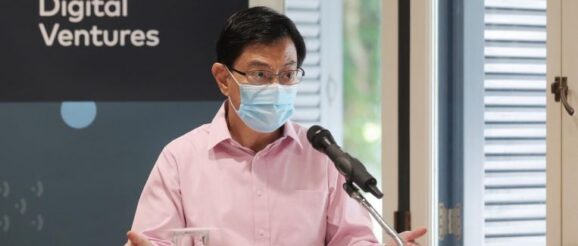Innovation crucial to Singapore’s economic recovery, says DPM Heng Swee Keat

SINGAPORE – Innovative ventures sprouting across the corporate landscape will provide crucial support to Singapore’s economic recovery, said Deputy Prime Minister Heng Swee Keat.
These new ventures can tackle structural challenges and harness opportunities in the post-Covid-19 world, he noted.
Mr Heng, who is also the minister for economic policies and finance, was speaking at the launch of BCG Digital Ventures (BCGDV) Rochester Park campus on Friday (Jan 22).
BCGDV is the corporate innovation and digital business building arm of the Boston Consulting Group (BCG). It invents, launches, scales and invests in new industry-changing businesses with large companies.
Mr Heng said corporate venturing is one of the few ways to drive innovation, the pursuit of which will become even more indispensable as the economy navigates the current crisis and the post-Covid-19 world.
“Investment in innovation has, and will always be, a cornerstone of our economic policy, and a focus of our budgets,” he said, pointing out that the Government had already committed to invest $25 billion over the next five years in research, innovation and enterprise.
Mr Heng congratulated BCG for bringing its Digital Ventures campus to Singapore, saying that it can add its broad range of expertise to the corporate venturing ecosystem in the Republic and in South-east Asia.
“The new campus will create exciting new jobs for our people, both within BCG and in the new ventures that you are helping to incubate and grow,” he said.
He said large companies have advantages that start-ups do not have, such as access to customers, established supply chains and distribution channels, and a strong base of intellectual property and know-how.
“The challenge is to find creative ways to find synergies between the capabilities of these large corporates with the fresh and creative ideas of start-ups to create successful new ventures,” he said.
He said BCGDV can make significant contributions to the Economic Development Board’s (EDB’s) efforts to partner with large corporates to create new ventures.
The campus can also add to the momentum of Singapore’s endeavour to build an ecosystem of venture studios to help companies that are new to the venturing process.

BCG can also use Singapore as a base to partner large corporates in the region where the digital economy is growing fast, he said.
He said Singapore is also re-doubling its efforts to strengthen its start-up ecosystem that has already produced several unicorns, the latest being Nanofilm – an advanced materials tech spin-off from Nanyang Technological University that was listed on the Singapore Exchange (SGX) in October last year.
“For budding entrepreneurs, we have Startup SG, which provides mentorship, funding and a whole range of support,” he said, adding that the Government in August had announced an additional $150 million to help start-ups get innovative ideas off the ground.
At the same time, the SMEs Go Digital programme will help the broad majority of companies and workers to adopt digital solutions, for which an additional $500 million was earmarked last year.
“This systems approach to innovation will give Singapore a competitive edge in a post-Covid-19 world and I’m glad that BCG is contributing to our growth as a Global-Asia innovation node.”
Mr Heng said BCG is also helping two of Singapore’s Alliances for Action – on Edutech and Sustainability – by facilitating ideation workshops.
As part of the Alliance of Sustainability, BCG has also worked with DBS Bank and SGX on a joint three-month sprint to develop a voluntary carbon credit marketplace for Asia.
Alliances for Action (AfAs) are industry-led coalitions tasked to devise ideas and generate jobs in areas such as sustainability, robotics and education technology. They were established by the Emerging Stronger Taskforce which was set up to study economic changes accelerated by the coronavirus.
Mr Heng said innovation will be critical to fuelling Singapore’s economic recovery, enabling it to harness opportunities in the post-Covid-19 world.
The BCGDV campus will add to the dynamism and vibrancy of Singapore’s innovation landscape, he said.
